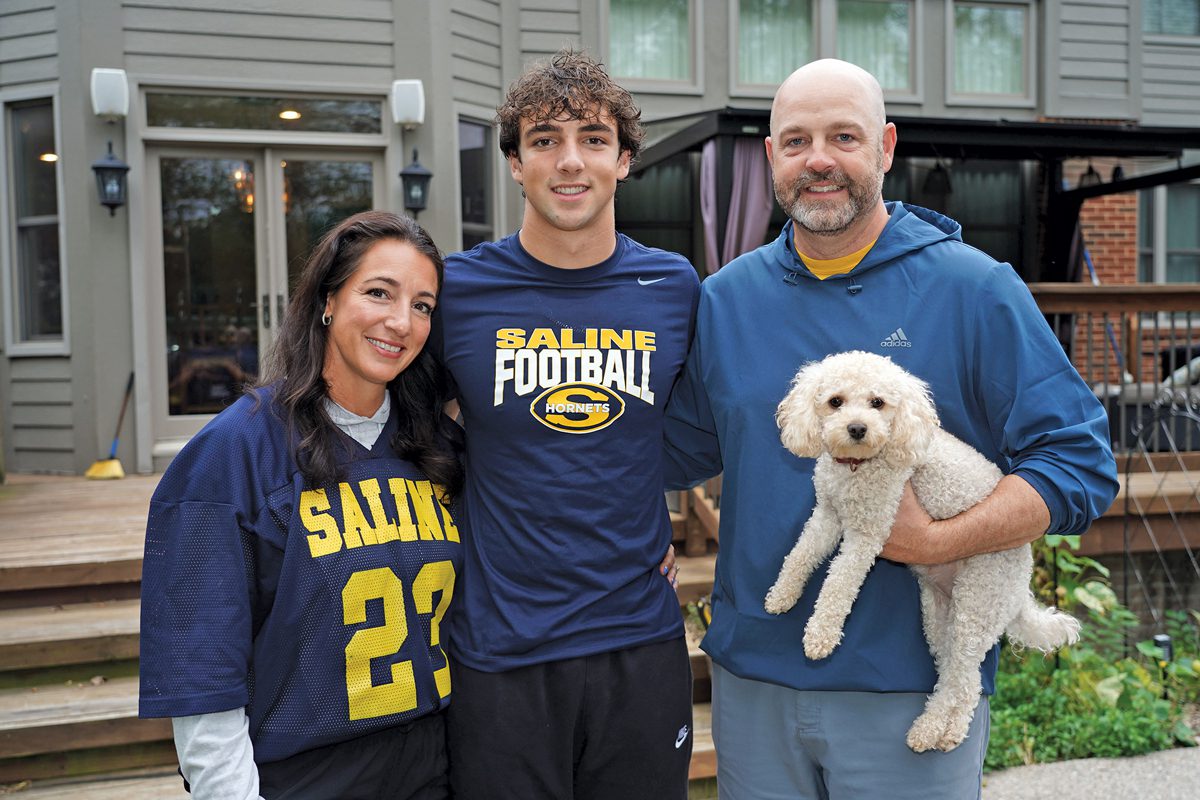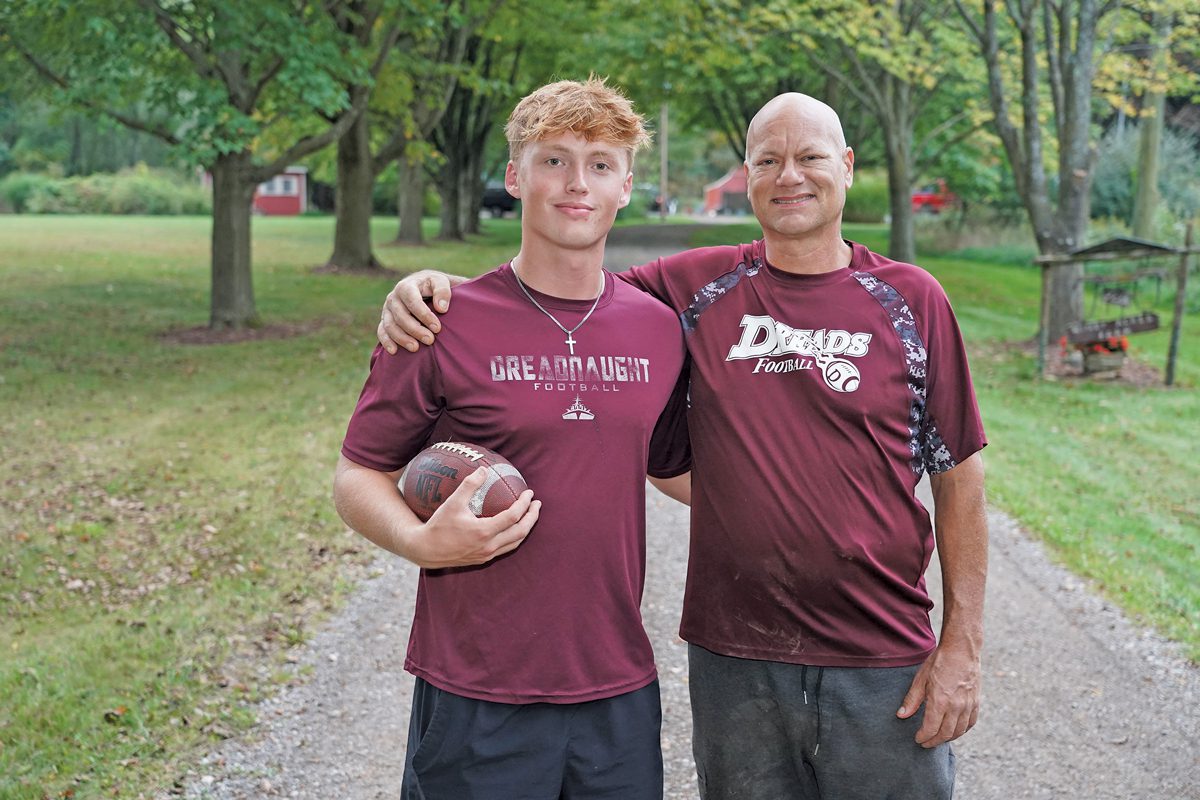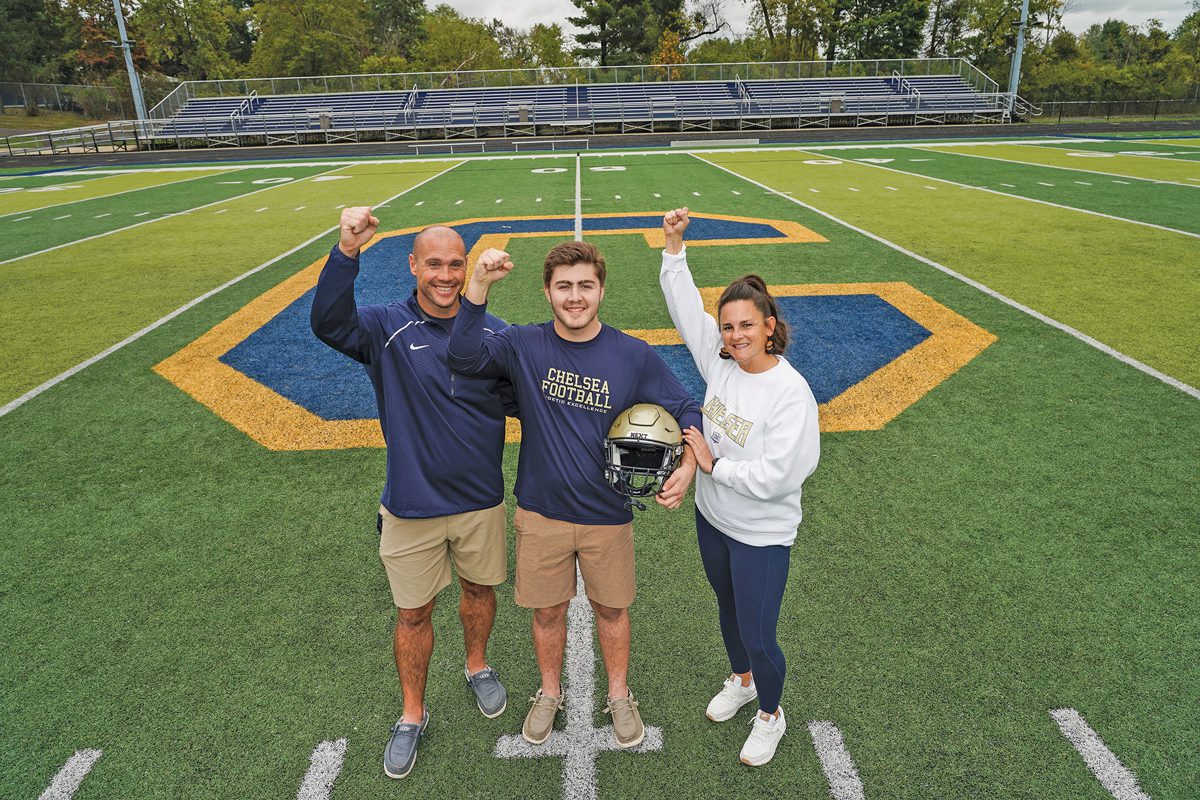At dusk, on fall Fridays across the county, the world of high school football comes back to life, like a prep sports version of Brigadoon. The marching bands. Singsongy cheerleader chants. An announcer’s booming voice. Armored athletes crashing into each other. And the bleacher crowd’s claps and jeers at the action unfolding before them, on 100 yards of astroturf.
It’s a whole thing.
In Saline, Chelsea, and Dexter, games can bring the entire community together. But what’s life like for those athletes, and their families, during football season? And what are the challenges and joys of being at the center of a marquee sport that draws as much scrutiny as it does fanfare?

“Football Fridays have become a fall season staple in our house,” says Janine Ross (with linebacker son Coleman, husband Brad, and Mallie). Coleman’s sisters “listen to hear their brother’s name, and our other son, Anderson, might be Coleman’s biggest fan.” | Photo by J. Adrian Wylie
Saline Hornets
Saline High senior linebacker Coleman Ross didn’t come from classic football stock.
“Nobody played sports in my family,” Janine Ross, Coleman’s mom, confesses. “So for me, I was a little apprehensive about injuries. I worry about it still, every single play. … But it’s easily my favorite sport to watch. … Especially when you get to watch your own child on the field, it’s really exciting.”
The entire Ross family—including Coleman’s three siblings and his father, Brad—are game regulars, whether the Hornets are playing at home or away.
“They just love the high-energy environment,” says Janine. “Football Fridays have become a fall season staple in our house and will take precedence over almost anything else. The girls don’t watch the game, but they listen to hear their brother’s name, and our other son, Anderson, might be Coleman’s biggest fan.”
Coleman’s enthusiasm for football was born of friendship.
“It’s a fun team sport to play with the guys you’re spending most of your time with,” he says. “I always liked that about it.”
Saline’s football program is a regional powerhouse, having made the Division I playoffs every year since 2012, and provided a solid training ground for college players like former U-M coach Lloyd Carr’s grandson, C.J. Carr (now playing quarterback at Notre Dame) and Dylan Mesman (tight end at Louisville).
But this season marks the team’s first year with coach Kyle Short at the helm. (Joe Palka, who led the Hornets for thirteen years, is now head coach at Adrian College.) Inevitably, this means changes are underway, but as I write this, Saline remains undefeated, including a convincing win against local rival Dexter High.
“It’s just about everyone doing your job,” says Coleman. “That’s always a big focus.”
Does being in the backyard of a major college football program have an impact?
“Any high school that’s close to a big college campus, you have coaches that work at the university living in your community,” says Brad. “So it’s always there, right? That presence. And obviously, there are a lot of former athletes from U of M that live in the Saline area.”
Training doesn’t necessarily end after the last game. Many of Saline’s players spend the rest of the school year in a strength and conditioning class.
“We do a lot of lifting in there,” says Coleman. “In the third tri[mester], when it gets warmer out, we’ll go out to the field and do field work for class, and then, when the second week of summer starts, we start doing whole team workouts and field work. … We start our full practice in August.”
Football traditions at Saline include the team running onto the field through a huge Hornets helmet (“It’s a lot of work to set up and tear down, but it’s pretty cool,” says Janine); pregame “varsity meals” for the team, donated by local restaurants; and a student section committee that picks a theme for each game (neon, camo, Minions, USA, etc.).
“I think half the reason he loves the sport so much is, they have team meals almost every day of the week during the season,” jokes Janine. “They’re always bounding around in this big pack, and they like to eat.”
Players must also stay on top of their schoolwork, but that doesn’t seem to faze Coleman. “It just puts an emphasis on using your time wisely, because you’re not getting home until 5:30, 6 o’clock every night, and then you’re exhausted from school and football,” says Coleman. “So you have to just sit down, get your stuff done, and go to bed.”
Coleman’s parents have been impressed by his discipline, and say that football has given their quiet son confidence and humility. But it’s also part of the reason it’s nearly impossible to plan Ross family vacations.
“Three of our four kids play sports, and it really consumes us almost every day of the week, year-round,” says Janine. “That’s the choice we made, so it’s not a complaint. But finding that balance between keeping to our commitments and grabbing quality time together is not always easy.”

Dexter linebacker and co-captain Nathan Gersh and his father, Dan, saw how coach Phil Jacobs turned Dreadnaughts football around with an emphasis on strength and conditioning. After playing and watching football ever since he can remember, as a junior Nathan is being recruited by a number of colleges. | Photo by J. Adrian Wylie
Dexter Dreadnaughts
When Dexter High junior linebacker (and co-captain) Nathan Gersh was growing up, the town’s Division 2 team was primarily known for being terrible.
“Before our head coach [Phil Jacobs] came in [2017], we were 0–42—like, four 0–9 seasons in a row, plus a little more,” says Nathan. “Then he came in … and I think we finished 6–4 that season. … And then, by my freshman season, we went 12–1, and we made it to the state semifinals, so that was amazing.
“Dexter had never seen anything like that before. We also beat Chelsea, who we hadn’t beaten in twenty-six years before that.”
How did Jacobs turn the program around?
“Strength and conditioning,” says Nathan, who’s now being recruited by a number of colleges. “Obviously, football’s a very physical sport, and strength plays a major role in that.”
“Everybody else was lifting,” Dan Gersh, Nathan’s dad, points out. “It’s a big commitment.”
As athletes got bigger and stronger, “the whole culture changed,” says Nathan’s mom, Becki Gersh. “All the kids started going to this gym in town called Anytime Fitness, and it became their hangout. … So not only were the kids doing it at school, they were doing it in their free time. It was a game changer.”
Dexter has made the playoffs for six straight seasons, and with just one loss (to Saline) as of press time, and two Big Ten recruits (lineman Cam Clark will play at Wisconsin, and running back Ronny Johnson is Northwestern-bound), they aim to compete again this season.
“Our coach preaches, ‘Do your one-eleventh,’ because there’s always eleven players on the field,” says Nathan. “If you do your job, and everybody else does, then the team will be successful. Being disciplined—that’s his big thing. Not losing your cool and causing a flag to be thrown.”
This foundation becomes all the more crucial during big rivalry games, like Dexter’s annual battle with neighboring Chelsea. “We’ve always had that rivalry, as long as I can remember,” says Nathan. “There’s always high tensions on the field, and it makes everybody want to hit harder. Our goal every year is to beat them.”
Sometimes, of course, the team has a disappointing night, and it’s up to leaders like Gersh to guide them through.
“When we lost, week two, I preached to my teammates that we can’t let this define us,” Gersh says. “We have to move on. And even winning the next game—it was still in the back of my head a little. Like, I was happy we won, but at the same time, we’d lost the week before, so we don’t have a perfect season anymore. But I just try my best … and move on, because it’s not going to help you, worrying about a loss.”
For bonding, the team has an annual paintball outing, and goes out to a team captain–planned dinner together every Thursday.
“We’re all very closely knit together,” says Nathan. “So that’s a tradition. Family is our tradition. Every time we break down a huddle, we say ‘family.’ We’re all just really close, and I think that helps us on the field.”
Nathan doesn’t seem to stress much about fitting schoolwork and daily training into his life.
“We are very lucky,” says Becki. “Both my kids—I’ve never had to say, ‘Do your homework.’ Being a student athlete, they have no choice but to be organized with their time.”
Like Coleman Ross, Nathan was, by his parents’ report, a quiet kid who has grown in maturity and confidence by way of football.
“I just like being around my friends,” says Nathan, who’s played and watched football ever since he can remember. “That’s probably the best part. It brings me joy, just having fun with my friends on Friday nights and in practices, spending time with the people I care about most, playing the sport I love.”
Related: Two-Sport Athletes

The Linde family is all-in on football: Tanner plays on the Bulldogs’ offensive line, his father Joe coaches the freshman team, and mom Jenni is the team’s booster rep. Younger brother Tyson, like Tanner, plays multiple sports. | Photo by J. Adrian Wylie
Chelsea Bulldogs
When it comes to Chelsea, the Linde family is all in.
Though they moved to town (from Tecumseh) only two years ago, Jenni Linde has taught in Chelsea for twenty-four years; her husband, Joe, is in his first year teaching physical education at Beach Middle School, and coaches freshman football; and the couple’s two sons, Tanner (a junior) and Tyson (a freshman), are multisport athletes.
“As soon as we all moved here, it was—dive in,” says Joe. Jenni “volunteered to be the football booster rep, and she and [new head coach] Noel Dean have gotten really close. It’s been a lot of work for her, but I think it’s been a great experience, and people are able to see how much time and effort can be put into a really successful football program as a whole—not just what’s on the field.”
Football holds a special place in the family’s heart: Jenni’s dad coached at Adrian College, and Joe played quarterback at Midland High School. Tanner plays on Chelsea’s offensive line—when he’s not wrestling or playing baseball for CHS.
“Anything I do, I want to give a good effort,” says Tanner. “So if I’m playing football, I’m going to work hard, no matter where I go with it. But I’ve always liked being part of the football team in this community, so I’m definitely going to put forth extra effort, since I know how much of a big deal it is.”
Big deal, indeed. Former coach Josh Lucas led CHS to a Division 4 state title in 2021, and the team won the Southeastern Conference Championship in 2023, ending the season with a 9–2 record. But Dean arrived in Chelsea with his own impressive resume, previously earning three Division 3 titles in Lowell—a feat that landed him a spot in the Michigan High School Football Coaches Hall of Fame.
One “new tradition” Dean has launched is the Red, White, and Blue Dogs game, which honors active military and veterans, and raises money for the local American Legion post. But older traditions remain too—including, when they win a game, a post-burning ceremony.
“The seniors paint posts of all of the opponents at the beginning of the year, and then, if you win, you burn that post while you eat [breakfast] together,” Jenni explains. “If they lose, they put that post up, so they can see it all year.”
Another standing tradition is “Future Bulldog Night,” which invites all of the town’s football players—from first grade flaggers to graduating seniors—to attend a game together.
“There were a lot of kids on the field, and they made a tunnel for us, so we could go out,” said Tanner. “That was really cool.”
Tanner doesn’t seem to sweat balancing football with his classwork (“I’m never really stressed,” he says; Joe adds, “That’s true”), but this seems more a function of his low-key personality than an indication of his true workload. For instance, each Saturday morning after the team’s Friday night games, they’re all back in the weight room by 8 a.m.
“These kids work really hard to get done what they need to get done, and do a lot of pacing throughout the week,” Jenni says. “Like, [Tanner] knows that tonight, he has to do a little bit extra of AP U.S. history that he has, because tomorrow night he’s got O-line dinner.”
This mindset is in keeping with Coach Dean’s emphasis, which is “noetic excellence.”
“That’s his mantra,” says Joe. “On the [players’ Chelsea Football] shirt, it says ‘noetic excellence,’ and he said, ‘If I’m giving you this shirt, it is your job at all times to demonstrate, to be able to think and speak intelligently in all areas of your life.’ Not just in football, but in your academic life, your family life—he expands it way beyond football, into growing men.”
Related: Starting Over
The Art of Tailgating
A Big House of Our Own



real sweet tanner!!!
-grams